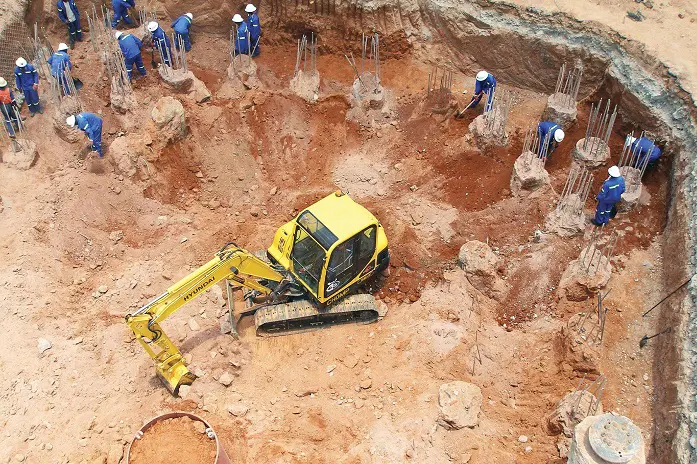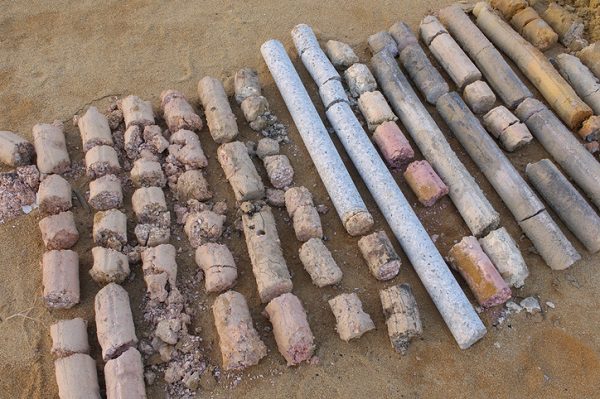Leading Reasons to Employ a Geotechnical Specialist for Your Construction Tasks
The Value of Geotechnical Design in Dealing With Environmental Difficulties and Enhancing Building Security
Geotechnical engineering offers as a cornerstone in the junction of environmental stewardship and building and construction security, providing essential insights right into the actions of soil and rock under numerous conditions. By applying tactical website investigations and customized mitigation procedures, geotechnical engineers play a crucial role in securing both human lives and eco-friendly stability.

Duty of Geotechnical Design
Geotechnical design plays a crucial role in the design and construction of infrastructure by dealing with the behavior of soil and rock materials under different conditions. This area of design is important for understanding the communication in between structures and the ground, which includes identifying the load-bearing capacity of soil, assessing security, and anticipating prospective settlement or failing.
Geotechnical designers are accountable for carrying out site examinations, which include sampling and testing dirt and rock to gather data on their chemical and physical buildings. This info is crucial for creating foundations, retaining wall surfaces, and other earth-retaining structures that make certain security and durability. Additionally, geotechnical design notifies the selection of ideal building methods and products, thus decreasing dangers associated with dirt behavior.
Furthermore, the assimilation of geotechnical engineering concepts into metropolitan preparation and environmental administration is essential for attending to challenges such as ground contamination and groundwater administration. By recognizing geotechnical elements, designers can develop sustainable options that enhance the durability of framework versus natural dangers, while additionally advertising environmental stewardship. Inevitably, the role of geotechnical engineering is crucial for achieving risk-free, sturdy, and environmentally mindful building techniques.
Dirt Erosion Mitigation
Soil erosion presents a substantial threat to both environmental stability and facilities honesty, influencing approximately 24 billion lots of productive dirt shed each year worldwide. This sensation is exacerbated by elements such as deforestation, urbanization, and bad agricultural methods. Geotechnical engineering plays an essential function in establishing efficient dirt disintegration reduction methods that secure both the atmosphere and building jobs.
One technique involves the application of erosion control techniques such as greenery planting, which stabilizes dirt via origin systems. Additionally, the building of preserving walls and balconies can effectively decrease surface drainage and shield at risk locations from erosion. Proper drainage layout is additionally vital; it lessens water build-up and directs excess drainage far from vital structures.
Moreover, geotechnical designers utilize soil stablizing methods, such as the application of geotextiles and biodegradable floor coverings, to improve soil communication and stop degradation - geotechnical engineer description. Normal monitoring and assessment of erosion-prone websites allow timely treatments, guaranteeing lasting sustainability. By integrating these strategies, geotechnical design not only alleviates the impacts of dirt erosion however also adds to the resilience of facilities against ecological difficulties, ultimately promoting a safer and a lot more lasting developed setting
Groundwater Protection Approaches
Groundwater acts as a crucial resource for drinking water, farming, and industrial processes, making its defense important for ecological sustainability and public wellness. Effective groundwater security approaches are vital in minimizing contamination risks and making sure the long life of this resource.

Regular monitoring of groundwater high quality is additionally vital, allowing early discovery of contamination resources and helping with prompt remediation initiatives. Utilizing innovative innovations, such as geophysical surveys and remote noticing, aids in recognizing potential threats to groundwater reserves.
Moreover, public education and stakeholder interaction are essential, cultivating community assistance for groundwater protection campaigns. all about geotechnical engineering. By combining governing measures, technological innovations, and community participation, we can create an extensive structure that safeguards groundwater resources while promoting sustainable growth and construction methods
Landslide Threat Management
Landslides present substantial threats to both human security and framework, making reliable risk management techniques important. Geotechnical engineering plays an important function in recognizing, analyzing, and mitigating landslide threats. A comprehensive understanding of slope stability, soil auto mechanics, and hydrology is essential for creating reliable threat management plans.
The primary step in landslide risk administration includes complete website examinations, that include geological mapping and dirt screening. These examinations assist designers examine the possibility for landslides by identifying critical elements such as slope angles, soil composition, and water content. Making use of sophisticated innovations such as remote noticing and geophysical surveys can improve the accuracy of these assessments.
As soon as threats are recognized, ideal reduction procedures can be carried out. These may include engineering remedies such as maintaining walls, drain systems, and slope stabilization techniques. Furthermore, checking systems need to be established to identify indicators of ground motion and changes in water degrees, enabling positive interventions.

Enhancing Construction Safety
Building sites typically provide a myriad of risks that can endanger worker security and project stability. Geotechnical engineering plays a vital function in enhancing construction safety by providing essential insights into subsurface conditions. Through comprehensive dirt and rock evaluation, geotechnical engineers can determine prospective dangers, such as soil instability, groundwater issues, and seismic vulnerabilities, which might jeopardize the security of construction activities.
Applying geotechnical remedies, such as correct foundation design and using maintaining structures, mitigates these threats substantially. These services not only make certain the security of the structures being constructed however also develop a much safer working environment for construction workers. Additionally, strenuous tracking and assessment of website conditions throughout the building and construction process are essential. Using advanced technologies like ground-penetrating radar and inclinometer systems makes it possible for real-time data collection, enabling timely treatments when hazards are identified.
Additionally, cultivating a society of security via training and adherence to developed safety and security protocols even more improves building website security. By incorporating geotechnical expertise into the planning and execution phases, construction projects can achieve higher safety standards, ultimately protecting workers and guaranteeing successful project conclusion.
Verdict
To conclude, geotechnical engineering works as a read the article crucial discipline in tackling environmental obstacles and advertising construction safety and security. Via reliable soil erosion reduction, groundwater defense methods, and landslide risk monitoring, geotechnical designers add to the development of resilient framework. The combination of these methods fosters a more secure construction environment and boosts the sustainability of civil engineering projects. Inevitably, the know-how of geotechnical engineers is indispensable in guarding both natural find more info deposits and human lives against potential threats.
Geotechnical engineering offers as a cornerstone in the crossway of ecological stewardship and building safety and security, offering important insights into the actions of soil and rock under different problems. Geotechnical engineering notifies the option of appropriate building and construction techniques and products, thereby reducing threats associated with soil habits.
Geotechnical design plays a pivotal duty in developing efficient dirt disintegration mitigation techniques that secure both the setting and construction projects.
In addition, geotechnical engineers employ soil stablizing strategies, such as the application of geotextiles and eco-friendly mats, to enhance soil cohesion and prevent deterioration. With thorough dirt and rock evaluation, geotechnical designers can recognize potential risks, such as soil instability, groundwater issues, and seismic susceptabilities, which may compromise the safety of construction activities.